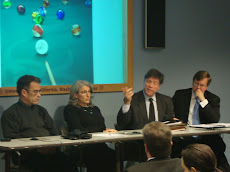skip to main |
skip to sidebar
From
The Vaccine Exchange:
We have been writing about the anthrax vaccine here at Vaccine Xchange for some time. It seems clear that Emergent BioSolutions, the maker of the only human anthrax vaccine (BioThrax) currently available in the US, is working to aggressively market the vaccine, including ensuring that its vaccine is authorized for use for use after inhaling anthrax, as well as before an exposure, despite serious concerns about its safety and effectiveness. Earlier this year, the company was awarded a $1.25 billion contract to supply the U.S. Government with 44.75 million additional doses of the vaccine over a five year period. A few weeks ago, a story in MarketWatch informed us that Emergent BioSolutions has announced a new study evaluating the safety and effectiveness of the vaccine for future treatment of individuals after they have been exposed to anthrax. This story follows on the heels of the Department of Health and Human Services backpedalling on conducting a trial of the same vaccine on children.
The study, which is funded by the Biomedical Advanced Research and Development Authority (BARDA) of the Department of Health and Human Services (HHS), could potentially expand the use of BioThrax beyond its current use as a pre-exposure vaccine so that it will be used along with antibiotics as an adjunct to treat people who have been exposed to anthrax spores.
It is obvious that such an expansion in the use of the vaccine would be heavily profitable for Emergent BioSolutions. However, it seems unnecessary – it has been demonstrated in many studies that early treatment of anthrax with antibiotics is very effective. Is it really necessary to replace this (reliable) treatment with a treatment that is not only highly expensive but also proven to have significant risk of adverse reaction?
Emergent BioSolutions does not intend the vaccine to work alone, but in tandem with antibiotics. This would have to be done because the vaccine is given in three doses two weeks apart post-exposure. This means that peak antibody levels will not occur until at least 35 days after beginning the vaccine course. In other words, you wouldn’t expect the vaccine to work until at least 35 days after starting taking the vaccine. But the reason Emergent BioSolutions has given for using vaccines post-exposure is to decrease the amount of time patients are on antibiotics. With the vaccine only beginning to work after 35 days at the earliest, there really does not seem to be a good reason to take the vaccine, particularly since vaccines have been shown to be less effective than antibiotics for anthrax (unless the anthrax strain has been made resistant to multiple antibiotics, which is theoretically possible but has never occurred). In any case, the CDC and the FDA would both still recommend a full 60-day regimen of the antibiotics, even if the patient is vaccinated, so the amount of time the patient is on the antibiotics will not be affected at all.
Not only this, but the data they are examining in this study – immunogenicity, which refers to antibody levels or similar blood parameters – is unreliable at predicting whether the vaccine will actually be effective upon a person’s exposure to the actual disease. In addition, similar data already exists, gathered in the trial conducted by the Center for Disease Control a few years ago. It seems puzzling that the government is investing even more taxpayer dollars to gather the very same data gathered by the CDC in its 2002-2007 clinical trial about this vaccine which has long been found to be unsafe and questionably effective.
However, for Emergent BioSolutions, this study could be extremely lucrative (particularly since it is being funded by the government, and therefore costing them nothing). If there is, God forbid, a biological attack using anthrax in the United States, and some people agree to take the vaccine, they would currently have to be studied, since this would be an unlicensed use of the vaccine. However, if Emergent BioSolutions can convince the Food and Drug Administration that, based on this study of 200 adults, the vaccine should be approved in post-exposure circumstances, then such a study would not have to be conducted on potentially thousands or millions of people who choose to get vaccinated post-exposure. In other words, in conducting this study now, where Emergent BioSolutions can control the data generated (as sponsor and conductor of the study), the company prevents a later study being conducted that will not be under their control and, because it would include many thousands of recipients, would be much more likely to identify problems with the vaccine’s safety and effectiveness. Not only this, but if the vaccine is approved for use after anthrax exposure, the government might even mandate its use after an anthrax attack in the future, thereby netting the company even more money.
Really, conducting the study makes tremendous financial sense for Emergent BioSolutions, even if the vaccine itself does not seem to be effective.










No comments:
Post a Comment